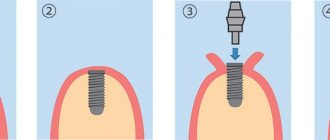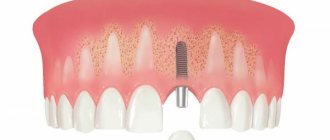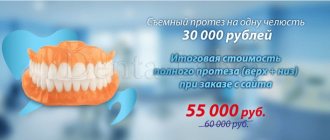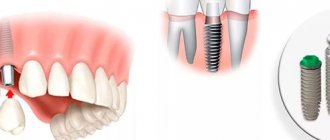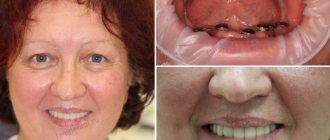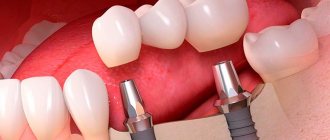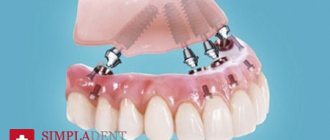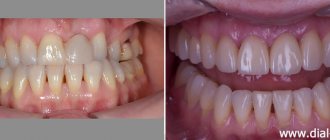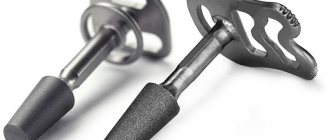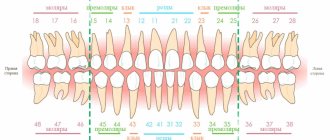The choice of prosthetics method depends on the characteristics of the clinical picture and the patient’s budget. In addition to the fact that each prosthetic option has its own advantages and disadvantages, its use may be impossible due to contraindications or other factors. At the same time, removable dentures for many are the only option to restore the usual quality of chewing and the normal appearance of the dentition, when fixed, conditionally removable prosthetics and implantation are unavailable for certain reasons.
The concept of removable prosthetics refers to many different options for orthopedic structures that inexpensively solve the problem of global absence of teeth, including those with terminal defects. It is the large number of models that can make it difficult for the patient to choose.
Choice according to indications and budget
The best dentures are those that are indicated for the patient. Generally speaking, the most modern designs will be those based on implants. However, there are two very important points here: implantation has a number of limitations and is considered an expensive procedure (especially if we are talking about complete dental restoration). In this case, other structures come to the rescue, which are also designed to restore chewing function and aesthetics. Before we start talking about the different systems in more detail, we need to make some distinctions so that you don't get confused.
All dentures are usually divided into several types. First of all, the number of teeth being replaced is taken into account: this criterion implies the installation of a partial or complete denture. According to the method of fixation of the structure in the oral cavity, removable, conditionally removable and fixed dentures are distinguished. Which ones are better - read on.
Orthopedic dentists in Moscow
Who is an orthopedic dentist?
An orthopedic dentist is a medical specialist who receives professional training in the field of prevention, diagnosis and treatment of dysfunction and integrity of the jaws and teeth. Treatment in Moscow is carried out using prosthetics, as well as the use of:
- regulatory devices,
- replacement devices.
What do orthopedic dentists do?
In Moscow, orthopedic dentists deal not only with pathologies of teeth or jaws, but also deal with diseases of the lips, gums, mouth, and tongue. They eliminate the consequences of trauma in the periodontal area, distributing the functional load on healthy teeth whenever possible. In addition, the scope of practice of an orthopedic dentist includes the following:
- treatment of pathology of masticatory muscles, periodontal disease, jaws;
- removal of injuries to hard tissues (pulp, teeth);
- elimination of supercontacts (balancing and hyperbalancing);
- relieving painful activity of the masticatory muscles;
- creation of stable and permanent central occlusion, elimination of its violation before the start of orthopedic treatment;
- after treatment – restoration of functional occlusion;
- disease prevention.
People are referred to orthopedic dentists in Moscow for diseases such as:
- periodontitis;
- caries;
- weakens teeth
- pulpitis;
- injuries;
- tooth erosion, etc.
What symptoms are referred to an orthopedic dentist?
The most common reason for visiting an orthopedic dentist in Moscow is the appearance of a carious cavity covered with dark dentin. The pathology manifests itself in a severe sore throat or sharp pain as a result of sour, salty, sweet things getting into the hole. It is also recommended to immediately contact an orthopedic dentist in the following situations:
- for acute night pain;
- for pain when eating or drinking;
- with constant aching pain, regardless of the time of day, aches;
- for pain when biting a diseased tooth;
- when you feel as if the tooth has grown;
- for pain in the gums, both constant and periodic;
- with edema or swelling;
- with inflammation of the gums;
- if there is bleeding during brushing your teeth and during the day;
- when a bag of pus appears on the gum, and so on.
To carry out successful treatment it is necessary to undergo a diagnosis. In Moscow, orthopedic dentists use diagnostic tools such as:
- computed tomogram,
- axiography,
- dental digital radiography,
- diagnostic models of jaws,
- TScan
- orthopantomogram - panoramic image of the jaws,
- wax modeling, etc.
Where in Moscow can you get this specialty?
Departments of dentistry and surgical orthopedics, where professional specialists - orthopedic dentists are trained to work in Moscow clinics, exist in such large universities as:
- RNIMU named after. N. I. Pirogova;
- MONIKI;
- MGMSU;
- MMA im. I. M. Sechenov;
- RMA;
- RUDN University and so on.
Famous Moscow specialists
The term "orthopedics" appeared in 1741. Andri introduced it. It was he who first named the new dental specialty. The term was made up of two Greek words - “orthos”, which means “straight”, and “paideuo” - “to form”, “to grow”.
In Russia, on the initiative of Katz, the term “prosthetic dentistry”, which existed at the beginning of the last century, was replaced in 1936 by the currently existing “orthopedic dentistry”. Under Soviet rule, the most active development of this science began. Gofung, Entin, Berkovich and many other great scientists and doctors paid special attention to it. Among the works in the field of dental orthopedics, the brilliant works of Sechenov, Botkin, Pavlov, and Bykov stand out.
Which denture is best for missing teeth?
Previously, patients who, for one reason or another, were unable to have implants installed, had to put up with rather uncomfortable prostheses made of hard plastic. Today there are modern designs on the market that cause virtually no inconvenience to their owner. Many are also looking for the best removable dentures for the upper jaw, since it is when restoring teeth in the upper jaw that good fixation of the structure is especially important so that the denture does not fall out in the most unexpected cases. Installation of a high-quality fixed (conditionally removable) complete denture is not complete without implantation.
Bridge prosthesis on implants
When several teeth are missing in a row, implant-supported dentures are the ideal choice. As a rule, 2 implants are installed, onto which a prosthesis imitating the crown part of the tooth is subsequently fixed.
Classic bridges
Fixed structures that replace a fragment of the dentition and are installed on adjacent ground teeth. The most modern bridges are usually made of ceramic and look more aesthetically pleasing than their metal counterparts.
Butterfly prosthesis
So named because of its shape, which resembles the wings of insects. Allows you to replace up to three missing teeth in a row. A plastic butterfly prosthesis imitates the crown of a tooth and part of the gum, attached to adjacent teeth using clasps. Application is justified as a temporary measure.
Clasp dentures
The best dentures of this type are considered to be structures made of nylon and acrylic, imitating part of the dentition on both sides of the jaw. There are designs with metal arches and with metal fixing elements (clasps), the disadvantages of which are allergic reactions, injury to one’s own supporting teeth and aesthetics.
Complete denture on implants with bar fixation
It is considered one of the best options for a complete denture on implants, since the load is distributed evenly across the entire beam and high stability of the entire structure is achieved.
Complete denture on implants with ball-shaped fixation
A spherical abutment is installed on each implant, which is fixed to the prosthesis using special locks. It is also considered an excellent option, but is slightly inferior to beam structures in terms of reliability.
Removable denture on mini-implants
Mini-implants are also installed into the bone, so the volume of bone tissue is just as important here as when installing standard implants. In this case, only removable structures are suitable for prosthetics, since mini-implants are used as a temporary option and cannot bear a more serious, permanent load.
Complete removable plate denture
Removable complete dentures completely model the jaw and palate. Today there are many models on the market, but the latest generation of acrylic and nylon prostheses are considered the most modern.
Which material is better and will last longer?
The material from which the prosthesis is made has the greatest impact on wearing comfort, and this is especially true for removable structures. If no errors were made during the manufacture of the structure itself, but the prosthesis still causes significant discomfort, then the problem is most likely due to the poor quality of the material. Of course, no such design can provide 100% convenience (especially at the adaptation stage), but modern materials make it possible to achieve very high performance. So, what qualities should the best materials for dentures have:
- Hypoallergenic.
Many people are allergic to dyes and acrylates. - "Friendly" to gums.
If the denture rubs the gums a lot, wearing it will be a complete torture. - Color fastness.
Immunity to staining and environmental influences. - Acceptable strength.
Despite the fact that a removable denture rarely lasts more than 5–6 years, the structure should not be overly fragile.
If we talk about specific brands of removable dentures, the best lamellar denture is considered to be Acry-Free (“Acry-Free”) made of acrylic-free plastic: it is very comfortable, does not shrink when worn, does not stain and does not cause allergies. The best nylon dentures at the moment are Quadrotti. However, they have limitations for use: to install such a prosthesis, one of the jaws must have several healthy teeth, however, like other clasp-type prostheses. As for non-removable systems, metal-free structures are increasingly being used, which look more aesthetically pleasing, do not cause allergies, but are no less durable.
Before and after installation of dentures. Works by P. A. Zotov
How much do the best dentures cost?
| Construction type | Price |
| Crowns | From 12,000 rubles for metal ceramics to 40,000 for zirconium crowns |
| Veneers | 20,000 – 55,000 rubles per unit |
| Partial denture on implants | From 70,000 rubles |
| Classic bridge | On average 8,000 – 15,000 rubles |
| Complete denture on implants | 150,000 – 600,000 rubles for one jaw. Depends on the number and brand of implants implanted. |
| Butterfly prosthesis | From 4,000 rubles depending on the material |
| Plate dentures | From 20,000 rubles. 30,000 – 35,000 rubles for Quadrotti prostheses |
| Removable complete denture | On average 35,000 rubles for a full Acry Free prosthesis |
| Removable denture on mini-implants | 100,000–120,000 rubles for one jaw |
Publisher: Expert magazine about dentistry Startsmile.ru
Types of removable dentures
Clasp
Clasp dentures are a metal semicircle on which a plastic gum bed is soldered. Crowns made of solid ceramics are inserted into the artificial gum in places where it is necessary to fill the missing teeth. In turn, clasp dentures are divided into several categories depending on the method of their attachment to existing teeth in the oral cavity - clasp, with locks/attachments, and the most complex method - with telescopic crowns.
The advantages of clasp removable prosthetics include strength, the possibility of repair and restoration, the ability of a rigid metal arch to transfer the load to all parts of the bone, and therefore slow down its atrophy in the area of the alveolar process. More details
Flexible
Soft prostheses are orthopedic products that do not have a rigid base. They are made from nylon or plastic by heat treating these materials. The main advantage of a soft prosthesis is its amazing aesthetics: the gum base is made of elastic, translucent material that completely merges with the gum. The most popular and effective removable dentures are Quattro Ti and Acry free. Such prosthetics are the choice of patients with allergies to metals, acrylic resins, and chronic gum disease. More details
Plate dentures
Lamellar removable dentures are a low-cost prosthetic option that allows you to restore any number of units in a row inexpensively and relatively quickly. Structurally, the product consists of an acrylic base into which plastic crowns are inserted. Among the disadvantages are the likelihood of developing an allergy to the free monomer in the acrylic mixture, the impossibility of repair, and long-term addiction.
In most cases, such prostheses are used as a temporary solution, for example, in the postoperative period - after a sinus lift or the first phase of classical implantation. More details
Removable dentures on implants
Removable dentures on implants - titanium dental rods are implanted into the bone tissue, osseointegrate, turning into substitutes for natural dental roots. After engraftment, any types of removable dentures can be effectively installed on such roots - ceramic, metal-ceramic, zirconium, etc. The orthopedic product is attached to the base of the implant, which makes the removable denture conditionally removable. This is the choice of those who want a solution of the highest quality, for the long term and to save themselves from the need to take out dentures every day for hygiene. More details
| Installation of removable dentures | price |
Clasp prosthesis on hooks (clasp)The price includes: all work and materials for the manufacture of the prosthesis, primary correction | 40,000 rub. |
Clasp prosthesis with locks (attachments)The price includes: all work and materials for the manufacture of the prosthesis, primary correction | 70,000 rub. |
Splinting clasp prosthesisThe price includes: all work and materials for the manufacture of the prosthesis, primary correction | 55,000 rub. |
Partial nylon removable dentureThe price includes: all work and materials for the manufacture of the prosthesis, primary correction | 40,000 rub. |
Clasp prosthesis MK for 1 jawThe price includes: all work and materials for the manufacture of the prosthesis, primary correction | 75,000 rub. |
Complete soft removable denture Akrifri for 1 jawThe price includes: all work and materials for the manufacture of the prosthesis, primary correction | 47,000 rub. |
Complete soft removable Quadrotti denture for 1 jawThe price includes: all work and materials for the manufacture of the prosthesis, primary correction | 64,500 rub. |
Full or partial acrylic removable denture for 1 jawThe price includes: all work and materials for the manufacture of the prosthesis, primary correction | 29,000 rub. |
Protective mouth guard for bruxism for 1 jaw | 6,500 rub. |
You can get acquainted with other types of dentures in the general section “Dental prosthetics”
Other jobs
